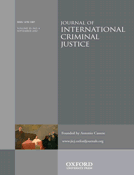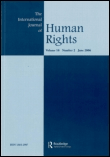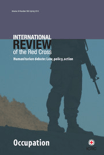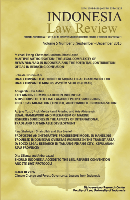
Journal of International Criminal Justice
Scope & Guideline
Illuminating critical issues in international criminal justice.
Introduction
Aims and Scopes
- International Criminal Law:
The journal focuses on the principles, practices, and challenges of international criminal law, exploring cases, statutes, and legal frameworks that govern the prosecution of international crimes. - Accountability Mechanisms:
It examines various mechanisms for accountability, including international tribunals, hybrid courts, and domestic legal systems, assessing their effectiveness and limitations in delivering justice. - Victims' Rights and Participation:
A significant focus is placed on the perspectives and rights of victims within international criminal proceedings, emphasizing their participation and the role of civil society in advocating for justice. - Transitional Justice:
The journal discusses transitional justice processes, including truth commissions and reparations, and their role in addressing past atrocities and fostering reconciliation. - Emerging Technologies in Justice:
It explores the intersection of new technologies and international criminal justice, including the use of digital evidence, open-source investigations, and the implications of artificial intelligence. - Environmental Crimes:
The journal addresses the growing importance of environmental crimes within the framework of international criminal law, examining legal definitions and prosecution challenges.
Trending and Emerging
- Child Soldiers and Youth in Conflict:
Recent publications have underscored the plight of child soldiers, particularly in the context of specific cases like Ongwen, highlighting the need for nuanced legal approaches and protections. - Digital Evidence and Open Source Investigations:
There is a growing emphasis on the role of digital evidence and open-source methodologies in documenting and prosecuting international crimes, reflecting advancements in technology and new investigative techniques. - Environmental Justice and Ecocide:
Emerging discussions around environmental crimes, including ecocide, illustrate a trend towards integrating environmental considerations into the framework of international criminal justice. - Gender and Sexual Violence:
The journal increasingly addresses issues related to gender-based violence and the specific challenges of prosecuting such crimes, emphasizing the need for gender-sensitive approaches in international law. - Accountability for Non-State Actors:
A noticeable trend is the focus on accountability mechanisms targeting non-state actors, including private military companies and rebel groups, as the nature of conflicts evolves. - The Impact of Misinformation on Justice:
The journal has begun to explore the implications of misinformation and disinformation for international criminal justice processes, particularly in the context of contemporary conflicts.
Declining or Waning
- Traditional War Crimes:
There seems to be a waning focus on traditional war crimes, with fewer articles dedicated to the historical context or legal definitions, as the journal shifts towards contemporary issues and new forms of conflict. - Colonialism and International Justice:
Discussions around colonialism's legacy in international justice appear to be less frequent, possibly as the journal pivots to more immediate global justice challenges, such as environmental issues and technological impacts. - State Accountability:
The emphasis on state accountability for international crimes has seen a decline, as the discourse increasingly centers on non-state actors and the complexities of modern warfare. - Gender-based Violence in Historical Context:
While gender-based violence remains a topic of interest, the focus on historical cases and analyses appears to be diminishing in favor of contemporary issues and case studies. - Legal Theory and Philosophy of Law:
There is a noticeable decrease in articles dedicated to the theoretical underpinnings of international criminal law, as practical applications and case studies take precedence.
Similar Journals

Vestnik of Saint Petersburg University-Law-Vestnik Sankt-Peterburgskogo Universiteta-Pravo
Pioneering Research in the Heart of Russian LawVestnik of Saint Petersburg University-Law, published by St Petersburg University Press, is a vital academic resource in the field of law, particularly significant within the Russian legal landscape. With an ISSN of 2074-1243 and an E-ISSN of 2587-5833, this journal serves as a platform for rigorous research, critical analysis, and scholarly discourse, contributing to the advancement of legal knowledge and practice. Although currently classified in the Q4 quartile for the year 2023 by Scopus rankings, it holds a unique position within the academic community, catering to a diverse audience of researchers, legal professionals, and students, especially those interested in the evolving nuances of law in Russia. You can explore comprehensive studies and articles that reflect the contemporary challenges and developments in law, while benefiting from the journal's focus on fostering a deep understanding of legal principles. The journal runs from 2019 to 2024, encapsulating emerging trends and insights in law that are critical for continuous learning and growth in this discipline.

University of Western Australia Law Review
Advancing Legal Discourse, Shaping TomorrowThe University of Western Australia Law Review is a prestigious academic journal dedicated to the critical examination and exploration of legal issues in Australia and beyond. Published by the Law School of the University of Western Australia, this journal has become a significant resource for legal scholars, practitioners, and students alike, contributing to the rich discourse in the field of law. With an ISSN of 0042-0328 and a current categorization in the Q3 quartile in the field of Law as per the 2023 rankings, it stands among a cohort of respected legal publications. The journal, though not open access, facilitates a sharing of unique insights and research from 2019 to 2024, aiming to address emerging and traditional legal challenges within a global context. With a Scopus rank of #651 out of 1025 in Social Sciences Law, it holds a percentile of 36, reflecting its valuable contributions to legal scholarship. The University of Western Australia Law Review invites researchers, practitioners, and students to engage with its rich content and to contribute to the ongoing dialogue shaping the future of law.

International Journal of Human Rights
Illuminating the Path to Justice and EqualityThe International Journal of Human Rights is a prestigious academic publication focusing on critical issues within the realm of human rights, law, sociology, and political science. Published by Routledge Journals, Taylor & Francis Ltd, this journal garners a significant reputation with a 2023 impact factor ranking it in the second quartile (Q2) within both the law and sociology categories. The journal provides a vital platform for researchers and scholars to disseminate original research, theoretical discussions, and comparative studies on pressing human rights concerns globally. With an impressive standing reflected in its Scopus ranks, placing it in the 84th and 72nd percentiles for law and sociology respectively, the journal plays an essential role in advancing the discourse on human rights. While it is not an open access publication, the journal prioritizes high-quality content and rigorous peer review, ensuring that it meets the academic standards demanded by its audience of researchers, professionals, and students committed to the advancement of human rights within diverse contexts.

International Review of the Red Cross
Exploring the intersections of law, action, and global impact.The International Review of the Red Cross, published by Cambridge University Press, serves as a premier platform for discourse in humanitarian law, humanitarian action, and international relations. With its ISSN 1816-3831 and E-ISSN 1607-5889, this esteemed journal covers a broad range of topics at the intersection of law, sociology, and political science, making it an essential resource for researchers, practitioners, and students alike. Currently maintaining a commendable impact factor and sitting in Q2 within its respective categories, the journal demonstrates its significant contribution to scholarly conversations, ranking #426 out of 1025 in Social Sciences - Law and #773 out of 1466 in Sociology and Political Science in 2023. The journal has been converging its critical insights and academic rigor since 2005 and will continue until 2024, fostering an environment for innovative research and interdisciplinary approaches. Engaging with open access content, it provides invaluable perspectives that shape policy and practice in humanitarian efforts on a global scale.

Melbourne Journal of International Law
Navigating the Complexities of International LawThe Melbourne Journal of International Law (ISSN: 1444-8602, E-ISSN: 1444-8610), published by the esteemed University of Melbourne, Melbourne Law School, is a premier forum for scholarly discussion and research in the field of international law. This journal aims to provide rigorous and innovative analyses of contemporary legal issues that transcend national borders, making significant contributions to both theory and practice. With its commitment to disseminating high-quality scholarship, the journal engages a diverse readership, including researchers, legal practitioners, and students, fostering a rich dialogue on the complexities of international legal frameworks. Although it does not currently offer open access, the Melbourne Journal of International Law remains a vital resource for those seeking to navigate the evolving landscape of international jurisprudence.

Ciencia Juridica
Championing High-Quality, Peer-Reviewed Legal InsightsCiencia Juridica is a distinguished academic journal published by UNIV GUANAJUATO, dedicated to advancing the field of legal studies. With its ISSN 2007-3577 and E-ISSN 2007-6142, this journal serves as a pivotal platform for scholars, researchers, and practitioners to disseminate innovative legal research and analysis. Although currently not an open-access journal, it ensures robust peer-reviewed content that maintains the highest academic standards. By focusing on a comprehensive range of legal topics, Ciencia Juridica aims to contribute significantly to the scholarly dialogue within the legal community, fostering critical thinking and innovative approaches to complex legal issues. The journal's commitment to enhancing legal scholarship makes it an essential resource for anyone engaged in the study or practice of law in Mexico and beyond.

Journal of Criminal Law
Illuminating Pathways in Criminal Law ScholarshipWelcome to the Journal of Criminal Law, a prestigious publication in the field of legal studies, expertly published by SAGE Publications Ltd. With a rich history that dates back to 1937, this journal has been a vital platform for disseminating innovative research and critical analyses pertaining to criminal law and justice issues. The journal boasts a commendable Q2 ranking in the Law category for 2023, placing it among the top tier of legal publications. It is recognized for its impactful contributions, as indicated by its impressive Scopus Rank of #346 out of 1025 in the Social Sciences - Law category, positioning it within the 66th percentile. Although it does not currently offer open access options, researchers, professionals, and students will find a wealth of rigorously peer-reviewed articles that address contemporary challenges and developments in criminal law. Based in the United States, the journal is committed to fostering scholarly dialogue and advancing understanding in an ever-evolving legal landscape.

Journal of Penal Law and Criminology-Ceza Hukuku ve Kriminoloji Dergisi
Unlocking Knowledge in Criminal JusticeThe Journal of Penal Law and Criminology-Ceza Hukuku ve Kriminoloji Dergisi, published by ISTANBUL UNIV, is a prestigious platform dedicated to the advancement of knowledge in the fields of criminal law and criminology. With its Open Access policy adopted since 2017, it aims to promote the dissemination of research findings and theoretical discussions, ensuring that vital insights in criminal justice, legal reforms, and criminological studies are accessible to a global audience. This journal serves as a vital resource for academics, legal practitioners, and students alike, fostering interdisciplinary dialogue and encouraging innovative research. By focusing on contemporary issues in penal law and criminology, the journal enhances understanding and addresses the complexities of justice in a rapidly changing society. With an ISSN of 2148-6646 and an E-ISSN of 2602-3911, it continuously strives to maintain high scholarly standards and relevance in its contributions to the field.

Indonesia Law Review
Navigating the Intersection of Law and Social SciencesIndonesia Law Review is a premier open-access academic journal dedicated to advancing knowledge in the fields of law and social sciences, with particular emphasis on the Indonesian legal landscape. Established by the Indonesian Law Review, this journal has made significant strides since becoming open access in 2014, ensuring that research is freely available to a global audience. Based in Depok, West Java, the journal seeks to foster scholarly discourse on legal issues pertinent to Indonesia, while also contributing to the broader field of education and social sciences. With its current Scopus rankings placing it within the top tiers of law and social sciences, including a Q3 categorization in law and a Q4 classification in education and miscellaneous social sciences, the **Indonesia Law Review** serves as a vital platform for researchers, professionals, and students to disseminate their findings and engage with contemporary legal dilemmas. The journal is committed to providing a robust forum for innovative legal scholarship and is an essential resource for anyone seeking to understand the complexities of law in Indonesia and beyond.

International Organizations Law Review
Navigating the Complexities of International Organizations LawInternational Organizations Law Review is a distinguished academic journal published by BRILL, focusing on the interdisciplinary intersections of law, political science, and economics in the context of international organizations. With an ISSN of 1572-3739 and an E-ISSN of 1572-3747, this journal has been a key player in advancing scholarly dialogue since its inception in 2004, and it is set to continue its vital contribution until 2024. Though currently categorized in the Q4 quartile across various domains, including Economics and Law, it holds a respectable position within Scopus rankings, indicating its growing influence in the social sciences. Researchers and professionals looking for critical insights and the latest research in international law and organizational dynamics will find this journal invaluable. The International Organizations Law Review is committed to fostering a deeper understanding of the legal frameworks governing international interactions, making it an essential resource for students and academics alike.